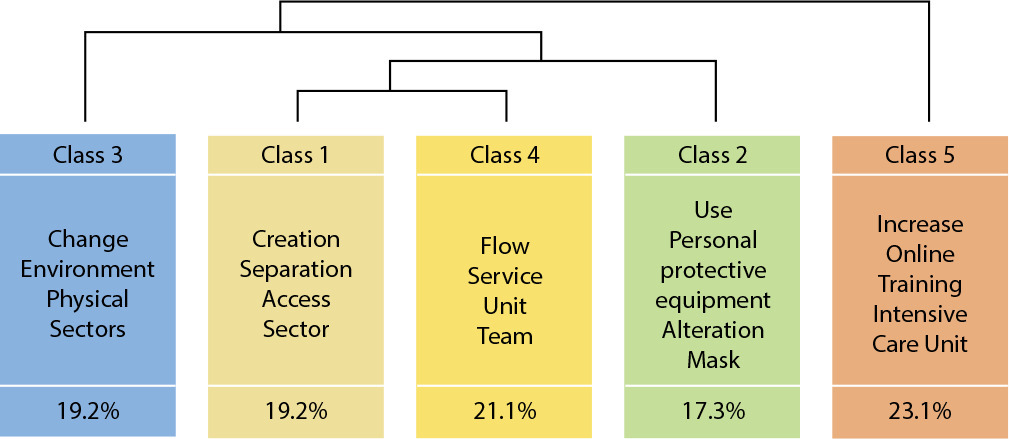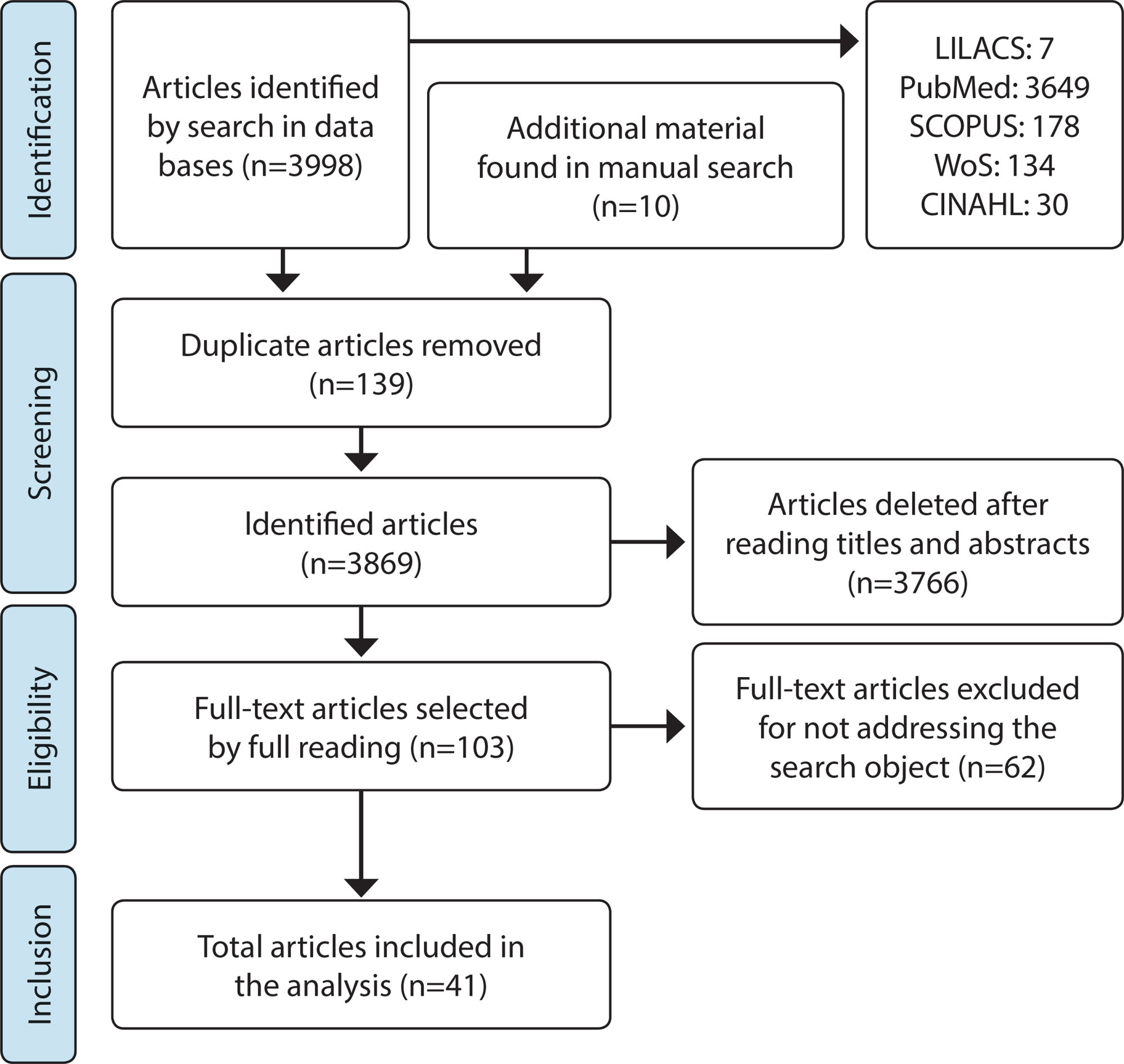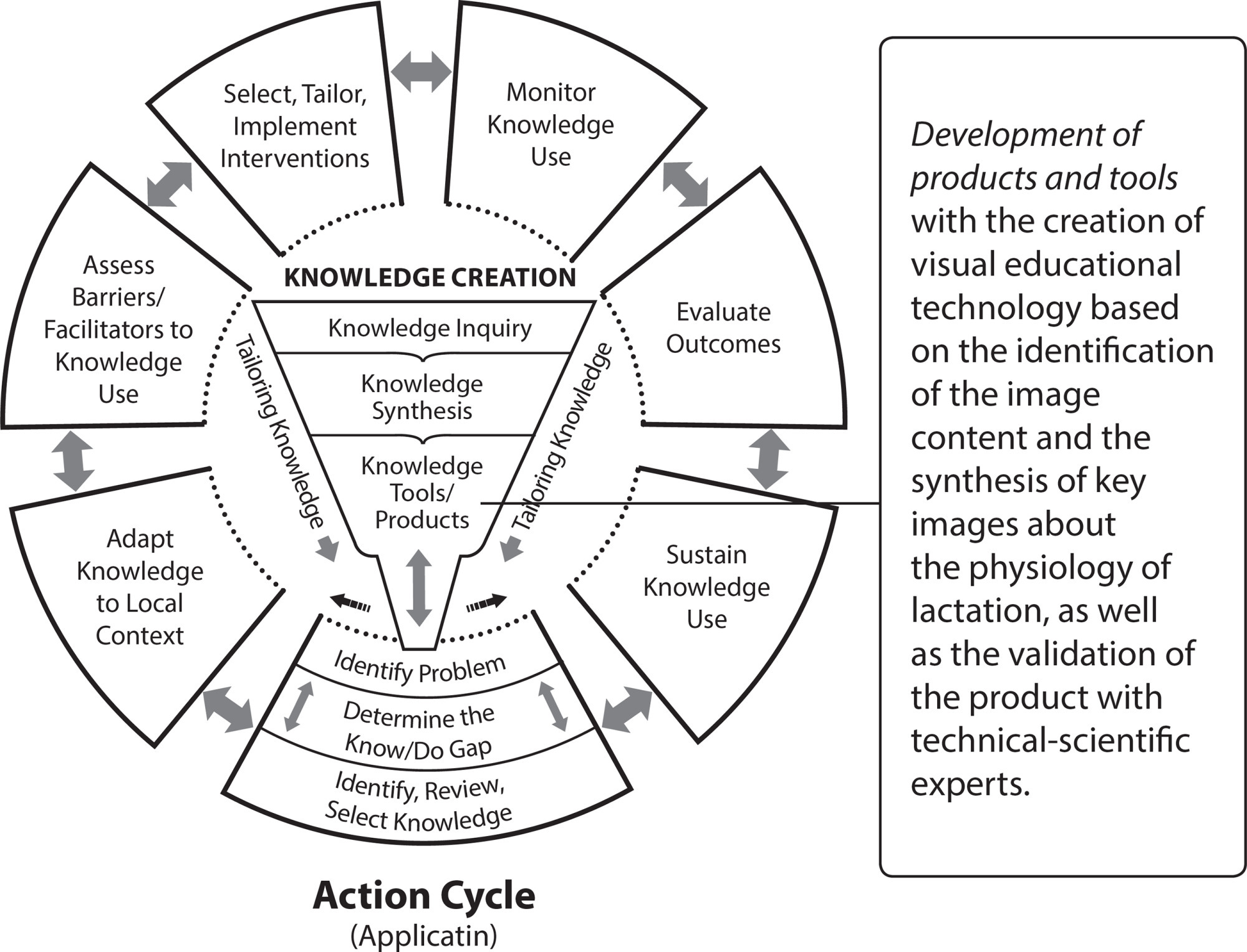-
ORIGINAL ARTICLE07-15-2024
Depressive symptoms and associated factors among travestis and transsexuals: a cross-sectional study
Revista Brasileira de Enfermagem. 2024;77:e20230071
Abstract
ORIGINAL ARTICLEDepressive symptoms and associated factors among travestis and transsexuals: a cross-sectional study
Revista Brasileira de Enfermagem. 2024;77:e20230071
DOI 10.1590/0034-7167-2023-0071
Views0See moreABSTRACT
Objectives:
to estimate the prevalence of depressive levels and their associated factors among transvestite and transsexual individuals.
Methods:
this cross-sectional study involved 58 participants assisted by non-governmental organizations. The Beck Depression Inventory was utilized to assess levels of depression, complemented by a sociodemographic questionnaire and a questionnaire on experiences of violence. Data were analyzed using descriptive statistics and Poisson regression with robust variance.
Results:
a prevalence of 27.6% (95% CI = 11.50-39.10) for moderate to severe levels of depression was observed. This prevalence was associated with being unmarried (PR = 1.19; 95% CI = 1.10-1.28) and experiencing violence in healthcare services (PR = 2.30; 95% CI = 1.10-4.81).
Conclusions:
the absence of a partner and experiences of violence in healthcare settings negatively impacted mental health, leading to an increased prevalence of depressive symptoms among transvestite and transsexual individuals. Advocating for transgender rights and providing ongoing education in health care for professionals are critical strategies in promoting the mental health of this population.
-
07-15-2024
Invisibilidade do trabalho da enfermagem: tecnologia como via de combate
Revista Brasileira de Enfermagem. 2024;77:e77suppl0301
Abstract
Invisibilidade do trabalho da enfermagem: tecnologia como via de combate
Revista Brasileira de Enfermagem. 2024;77:e77suppl0301
DOI 10.1590/0034-7167.202477suppl0301pt
Views0Na concepção comum, o trabalho é comumente associado a uma atividade remunerada em uma sociedade mercantil e de direito, refletindo a visão moderna que o limita ao tempo trocado por salário. Essa perspectiva, influenciada pelos princípios da Revolução Industrial, estabelece uma dicotomia entre o trabalho e o tempo fora dele, segmentando a vida em esferas […]See more -
07-08-2024
Can nursing contribute to reducing mortality from land transport accidents?
Revista Brasileira de Enfermagem. 2024;77(4):e770401
Abstract
Can nursing contribute to reducing mortality from land transport accidents?
Revista Brasileira de Enfermagem. 2024;77(4):e770401
DOI 10.1590/0034-7167.2024770401
Views0Morbidity and mortality from external causes, especially those resulting from land transport accidents (LTA), persist as a global challenge, given that they account for around 2 million lives lost annually, impacting various segments of society, especially in health services and systems().Evidence indicates that LTA are preventable, although historically they have been considered inevitable. However, isolated […]See more -
07-08-2024
¿Puede la enfermería contribuir a reducir la mortalidad por accidentes de transporte terrestre?
Revista Brasileira de Enfermagem. 2024;77(4):e770401
Abstract
¿Puede la enfermería contribuir a reducir la mortalidad por accidentes de transporte terrestre?
Revista Brasileira de Enfermagem. 2024;77(4):e770401
DOI 10.1590/0034-7167.2024770401es
Views0La morbilidad y la mortalidad por causas externas, especialmente las resultantes de accidentes de transporte terrestre (ATT), persisten como un desafío global, dado que es responsable de alrededor de 2 millones de vidas perdidas anualmente, impactando a diversos segmentos de la sociedad, especialmente en los servicios y sistemas de salud().La evidencia indica que los ATT […]See more -
ORIGINAL ARTICLE06-28-2024
Nursing leadership strategies in addressing COVID-19 in light of John Kotter’s framework
Revista Brasileira de Enfermagem. 2024;77:e20230289
Abstract
ORIGINAL ARTICLENursing leadership strategies in addressing COVID-19 in light of John Kotter’s framework
Revista Brasileira de Enfermagem. 2024;77:e20230289
DOI 10.1590/0034-7167-2023-0289
Views0See moreABSTRACT
Objective:
To analyze the leadership strategies of nurses in university hospitals in response to care management changes during the COVID-19 pandemic, informed by John Kotter’s insights.
Methods:
This multicentric study utilized qualitative and analytical methods. It was conducted through semi-structured interviews with 139 lead nurses from 10 university hospitals in Brazil. Data analysis included Bardin’s content analysis and the webQDA software.
Results:
The primary category identified was “Nursing Leadership Strategies in the Battle Against COVID-19,” encompassing five subcategories. This category underscored the importance of strategic vision in nursing leadership for combating COVID-19 within hospital settings, as well as the necessity of working collaboratively with their teams and other healthcare professionals.
Final Considerations:
The results highlight the strategies used by lead nurses in confronting COVID-19, which can be associated with John Kotter’s theoretical framework and his model of change.
-
ORIGINAL ARTICLE06-28-2024
Palliative Care for SARS-CoV-2 Patients in the Intensive Care Unit: A Comprehensive Study
Revista Brasileira de Enfermagem. 2024;77:e20230218
Abstract
ORIGINAL ARTICLEPalliative Care for SARS-CoV-2 Patients in the Intensive Care Unit: A Comprehensive Study
Revista Brasileira de Enfermagem. 2024;77:e20230218
DOI 10.1590/0034-7167-2023-0218
Views0See moreABSTRACT
Objective:
To comprehend the multiprofessional actions regarding palliative care for patients in the Intensive Care Unit affected by SARS-CoV-2.
Methods:
A comprehensive qualitative study conducted with 31 professionals from the Intensive Care Units of a university hospital, based on the Theory of Peaceful End of Life.
Results:
The analysis of the discourse led to the identification of two categories: “Multidisciplinary actions to promote comfort at the end of life” and “Palliative care during the pandemic period and the promotion of emotional and spiritual comfort.”
Final Considerations:
It became evident that local administration needs to invest in measures that reduce barriers to the implementation of palliative care during times of crisis. Understanding the discourse highlighted that non-specialized professionals can provide basic palliative care appropriately, without diminishing the importance and necessity of the presence of palliative care specialists in various hospital areas.

-
ORIGINAL ARTICLE06-28-2024
Quality of life at work for health professionals during the COVID-19 pandemic
Revista Brasileira de Enfermagem. 2024;77:e20230461
Abstract
ORIGINAL ARTICLEQuality of life at work for health professionals during the COVID-19 pandemic
Revista Brasileira de Enfermagem. 2024;77:e20230461
DOI 10.1590/0034-7167-2023-0461
Views0See moreABSTRACT
Objective:
to evaluate the quality of life at work of health professionals in direct and indirect care of COVID-19 cases.
Methods:
this was a cross-sectional study with 156 health professionals from a referral hospital. The relationship between sociodemographic and work-related variables and perceived stress and domains of the Quality of Life at Work Scale was investigated using inferential statistics and regression.
Results:
Satisfaction with Compassion was moderate (mean: 38.2), with low perception of stress, Burnout and Secondary Traumatic Stress (means: 18.8, 21.6 and 19.1). There were associations between: education, salary, multiple jobs and direct care with Compassion Satisfaction; low income, being a nurse and working overtime with Burnout; and working more than 12 hours, underlying disease and hospitalization for COVID-19 with Secondary Traumatic Stress.
Conclusion:
quality of life at work was satisfactory, despite the presence of Burnout and Secondary Traumatic Stress.
-
ORIGINAL ARTICLE06-28-2024
Uncertainties experienced by nursing professionals who contracted Covid-19: a priori, everyone is human
Revista Brasileira de Enfermagem. 2024;77:e20230142
Abstract
ORIGINAL ARTICLEUncertainties experienced by nursing professionals who contracted Covid-19: a priori, everyone is human
Revista Brasileira de Enfermagem. 2024;77:e20230142
DOI 10.1590/0034-7167-2023-0142
Views0See moreABSTRACT
Objective:
To analyze the uncertainties experienced by nursing professionals who contracted COVID-19.
Methods:
This qualitative research was conducted with 20 nursing professionals who fell ill from COVID-19. Data collection was carried out through semi-structured interviews; the data were then organized using thematic analysis and discussed in the context of Merle Mishel’s Reconceptualized of Uncertainty in Illness Theory.
Results:
The antecedents of the disease had a strong influence on how nursing professionals who contracted COVID-19 perceived uncertainty. The media coverage of the increasing number of cases, the collapse of the healthcare system, and the high mortality rate contributed to associating the disease with fear and panic.
Final Considerations:
Viewing it from the perspective of the disease’s antecedents, the illness of a nursing professional from COVID-19 underscores that before being professionals, they are human beings just like anyone else, undergoing adversities and facing the possibilities associated with being ill.
-
ORIGINAL ARTICLE11-29-2022
Changes implemented in the work environment of nurses in the COVID-19 pandemic
Revista Brasileira de Enfermagem. 2022;75:e20201381
Abstract
ORIGINAL ARTICLEChanges implemented in the work environment of nurses in the COVID-19 pandemic
Revista Brasileira de Enfermagem. 2022;75:e20201381
DOI 10.1590/0034-7167-2020-1381
Views0See moreABSTRACT
Objective:
to describe the changes implemented in the work environment of nurses in university hospitals considering the COVID-19 pandemic.
Methods:
this qualitative and descriptive research was developed from an online survey with 75 nurses from three Brazilian university hospitals. Data processing occurred through textual analysis with the aid of software IRAMUTEQ.
Results:
five semantic classes were obtained: Organization of units for exclusive care of patients with COVID-19; Adaptations in the use of personal protective equipment; Physical structure adaptation; Care flow institution; Increased number of beds and training courses. Final considerations: the results show the effort of healthcare and nursing professionals/managers in the development of structural adaptations and reorganizations of care processes, in the hospital context, to respond with quality and efficiency to the demands arising from the COVID-19 pandemic.

-
ORIGINAL ARTICLE10-21-2019
Permanent education for good practices in the prevention of pressure injury: almost-experiment
Revista Brasileira de Enfermagem. 2019;72(6):1646-1652
Abstract
ORIGINAL ARTICLEPermanent education for good practices in the prevention of pressure injury: almost-experiment
Revista Brasileira de Enfermagem. 2019;72(6):1646-1652
DOI 10.1590/0034-7167-2018-0778
Views0See moreABSTRACT
Objective:
To verify the effectiveness of the educational intervention through the evaluation of nurses’ knowledge about prevention of pressure injury.
Method:
A quasi-experimental study with a single group, carried out with 95 nurses from a teaching hospital in the interior of Minas Gerais, in August and September 2017. As a teaching strategy, the active methodology and hybrid teaching were used, based on the reference of the Method of the Arch of Charles Maguerez. Data were collected from a validated instrument, called the Pieper Knowledge Test, and analyzed by descriptive statistics and Student’s t-test with significance level of p <0.001.
Results:
The mean number of correct answers obtained by the nurses was 78.8% in the pre-test and 88.8% in the post-test, and the difference was statistically significant (p <0.001).
Conclusion:
The educational intervention developed was effective, since it contributed to the improvement of nurses’ knowledge.

-
ORIGINAL ARTICLE12-05-2019
Nurse care for the hospitalized elderly’s spiritual dimension
Revista Brasileira de Enfermagem. 2019;72:236-242
Abstract
ORIGINAL ARTICLENurse care for the hospitalized elderly’s spiritual dimension
Revista Brasileira de Enfermagem. 2019;72:236-242
DOI 10.1590/0034-7167-2018-0685
Views0See moreABSTRACT
Objective:
to analyze the nurse care for the spiritual hospitalized elderly’s dimension.
Method:
a qualitative study, based on Jean Watson’s Theory of Human Caring. The study included 17 nurses working in a geriatric center in Salvador City, Bahia State, Brazil. The collection of testimonies occurred between January and April of 2018, through an interview.
Results:
spiritual care were dialogue, encouragement and respect for religious activities, embracement, empathy. One of the obstacles to providing this care was the lack of preparation in accessing the elderly’s spiritual dimension.
Final considerations:
spirituality is a dimension of human and holistic nursing care. Caring for the spirit contributes to foster transpersonal care. The difficulty may be in the lack of nurses’ preparation. It is necessary that they cultivate and live their own spirituality, transmitting the understanding in each care relationship.
-
EXPERIENCE REPORT04-03-2020
Use of webQDA software on qualitative nursing research: an experience report
Revista Brasileira de Enfermagem. 2020;73(3):e20180411
Abstract
EXPERIENCE REPORTUse of webQDA software on qualitative nursing research: an experience report
Revista Brasileira de Enfermagem. 2020;73(3):e20180411
DOI 10.1590/0034-7167-2018-0411
Views0See moreABSTRACT
Objectives:
to report the user experience of the webQDA software in the support of qualitative data analysis about health literacy of older adults.
Methods:
quasi-experimental research developed from January 2014 to January 2015, with 118 older adults, all of whom were interviewed to assess the level of health literacy. Interviews were carried out before and after four educational interventions, according to Freire’s method named Culture Circle. The interviews were transcribed and entered in the software, which highlighted the analytical categories.
Results:
the systems of sources, interpretative encoding and questioning of the data available in the software allowed the construction of three categories for the literacy levels and four categories for their dimensions.
Final considerations:
We concluded that the webQDA software enables the structured encoding of qualitative materials, ensuring faster and effective management of data with systematization and analytical transparency.

-
03-03-2021
Concept analysis of Perioperative Thirst for the development of a new nursing diagnosis
Revista Brasileira de Enfermagem. 2021;74(1):e20200065
Abstract
Concept analysis of Perioperative Thirst for the development of a new nursing diagnosis
Revista Brasileira de Enfermagem. 2021;74(1):e20200065
DOI 10.1590/0034-7167-2020-0065
Views1See moreABSTRACT
Objectives:
to analyze the perioperative thirst concept for the development of a new diagnostic structure according to NANDA International.
Methods:
a concept analysis study based on the framework proposed by Walker and Avant, instrumentalized through an integrative literature review based on SCOPUS, CINAHL, PUBMED, LILACS, and WOS. The elaboration of the diagnostic structure followed NANDA International guidelines.
Results:
41 studies were analyzed revealing that perioperative thirst is prevalent and intense, having visceral and behavioral attributes as the core of the concept. Antecedents indicate that surgical patients are vulnerable to thirst; and consequents 16 signs and symptoms were organized and model cases were developed. A diagnostic structure has been developed for perioperative thirst.
Final Considerations:
concept analysis allowed language standardization that describes thirsty patients, helping the identification, planning of actions and communication of perioperative nursing care.

-
REFLECTION05-11-2022
Nursing Process in the Brazilian context: reflection on its concept and legislation
Revista Brasileira de Enfermagem. 2022;75(6):e20210898
Abstract
REFLECTIONNursing Process in the Brazilian context: reflection on its concept and legislation
Revista Brasileira de Enfermagem. 2022;75(6):e20210898
DOI 10.1590/0034-7167-2021-0898
Views0See moreABSTRACT
Objectives:
to reflect on the global understanding of the Nursing Process concept, with emphasis on the Brazilian context.
Methods:
a reflection article, aligned with the vision and expertise of researchers who are members of the Nursing Process Research Network.
Results:
the reflection is presented in two main topics: The evolution of Systematization of Nursing Care X Nursing Process concepts and its consonance with national and international practices, and Brazilian legislation; The Nursing Process concept realignment in Brazilian legislation in line with current care, teaching and research practices. Final Considerations: the reflections were oriented to the Nursing Process’ conceptual, normative and legal issues, including elements of its historical evolution, and, with that, pointed to the need to modify the Brazilian regulation on the Nursing Process.
-
ORIGINAL ARTICLE09-07-2020
Creation and validation of a visual educational technology content for lactation physiology learning
Revista Brasileira de Enfermagem. 2020;73(6):e20190564
Abstract
ORIGINAL ARTICLECreation and validation of a visual educational technology content for lactation physiology learning
Revista Brasileira de Enfermagem. 2020;73(6):e20190564
DOI 10.1590/0034-7167-2019-0564
Views0See moreABSTRACT
Objective:
to create and validate a visual educational technology content for lactation physiology learning.
Method:
a methodological study that contemplated the stages of content creation and validation guided by the conceptual model of Knowledge Translation into action. The creation took place in partnership with the educational technology center of the project’s home institution. The validation was attended by 27 judges with experience in the obstetric, neonatal, pediatric or maternal and child areas and in the theme of breastfeeding.
Results:
an educational technology covered animation and video techniques to locate, respectively, elements of lactation physiology and the population involved. An Overall Content Validity Index of 0.84 was obtained.
Conclusion:
the visual educational technology for lactation physiology learning has been validated in content as a tool to introduce the theme and mediate health education actions that can have a positive impact on breastfeeding.

-
ORIGINAL ARTICLE08-20-2021
Risk of suicide among nursing students
Revista Brasileira de Enfermagem. 2021;74(6):e20200867
Abstract
ORIGINAL ARTICLERisk of suicide among nursing students
Revista Brasileira de Enfermagem. 2021;74(6):e20200867
DOI 10.1590/0034-7167-2020-0867
Views0See moreABSTRACT
Objectives:
to identify the risk and degree of risk of suicide in nursing students of a public institution in the countryside of Pernambuco, Brazil.
Methods:
this was a cross-sectional, quantitative research conducted with 150 students. For data collection, a sociodemographic questionnaire and the instrument, M.I.N.I. – Brazilian version 5.0.0 – Module C – Risk of suicide were used. Statistical analyses were performed with IBM(® )SPSS(®), version 23.
Results:
53.3% of nursing students had a risk of suicide, of which 20.7% had a high risk. Moreover, 22.67% reported previous suicide attempt. It is noteworthy that students without a partner have a higher risk of suicide (56.8%) than those with a partner (29.4%).
Conclusions:
it is perceived the need to develop programs that identify students at risk of suicide in higher education institutions, in order to raise awareness of the problem and implement policies to promote mental health in the academia.
Search
Search in:
Nuvem de Tags
Adolescente (85) Atenção Primária à Saúde (239) COVID-19 (91) Criança (91) Cuidados de Enfermagem (269) Educação em Enfermagem (151) Educação em Saúde (139) Enfermagem (930) Enfermagem Pediátrica (86) Estudantes de Enfermagem (77) Estudos de Validação (131) Família (87) Idoso (208) Promoção da Saúde (99) Qualidade de Vida (104) Saúde do Trabalhador (86) Saúde Mental (145) Saúde Pública (82) Segurança do Paciente (150) Tecnologia Educacional (100)



